Be
By Chris Ritter ’21 for Bowdoin MagazineEllis Laifer and Tobi Omola, both Class of 2019, turned their band first into an honors project, and then into a career. Fortuno was unusually successful, and not just for a college band.
Within months of releasing their first official single, “Be,” their senior year, Fortuno had tens of thousands of listeners, and “making it” seemed nothing more than a matter of time.
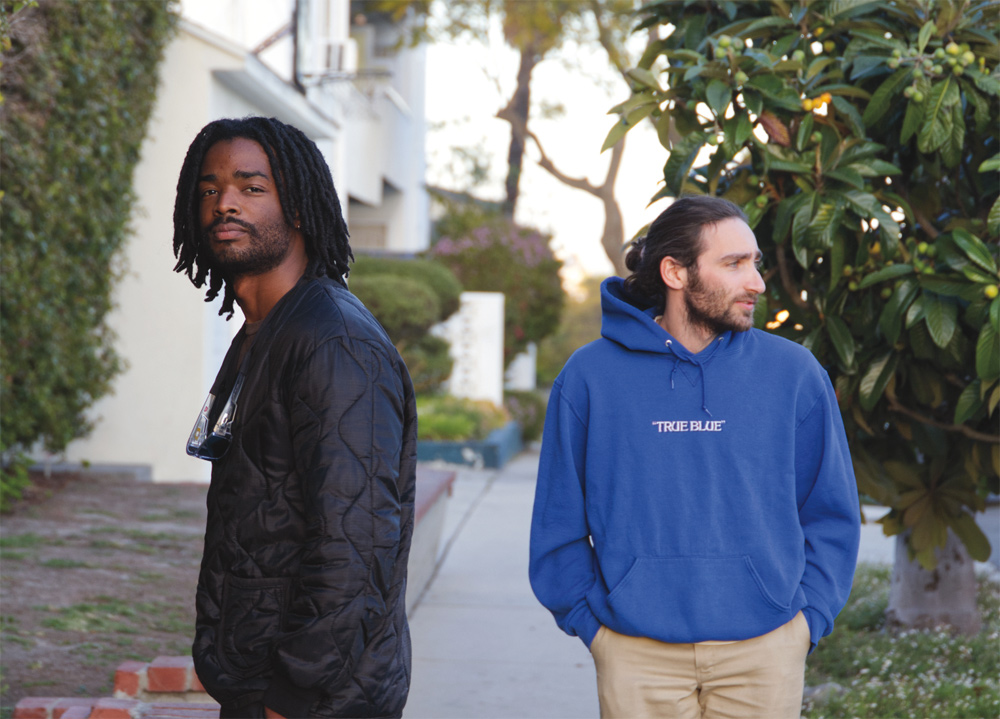
Driving in Los Angeles is “about as fun as you make it,” says Ellis Laifer ’19 as we’re riding through the sprawly center of LA’s Pico-Robertson neighborhood. Tobi Omola ’19 is in the driver’s seat, trying in vain to get into the left-turn lane to get to his and Laifer’s apartment.
“This guy is not letting me in,” Omola mutters, swearing. He gives up, presses the gas, and speeds across the intersection. “Now they made me take the long way home.”
“Hey, bro,” Laifer teases, “long route for the view, it’s all good.” Omola laughs, getting the reference.
“I took the long route for the view” is the opening lyric of “Home,” which, with over four million plays on Spotify, is the biggest song Omola and Laifer have released so far as Fortuno, the indie pop and R&B group the two started as sophomores in college. Fortuno is what led them here to LA, where they moved a month after graduating in the spring of 2019.
The weekend I’m visiting, Omola, Laifer, and Fortuno’s third member, guitarist Eli Koskoff, are hosting a dinner party where they’ll preview new music. A proper release show at a venue with a full band is in the works for later, but for now, something lower key feels right: pizza, Modelos, thirty or so friends, and a music setup that would fit right in at an NPR Tiny Desk Concert.
There’s an air of anticipation around this function despite its low-key vibe. This new music is part of something they’ve never made as Fortuno: an album-length work. The plan is to play stripped-back versions of these songs—a few from the new eleven-song project, a few old favorites—in the office of the production studio where Omola works.
Speaking of work, Omola has to get there soon. It’s Friday morning, the day before the party, and before tonight’s rehearsal, Laifer has music lessons to teach, and Omola has his full-time job. But in the LA traffic, Omola tells of friends who have gotten into minor crashes lately. He insists they’re in no rush.
“I would make a U-turn,” he pauses, eyes locked on the road ahead. “But it would suck to get into an accident with you, Chris.”
The long route it is.
Omola and Laifer met in an a cappella group. The two auditioned for the Bowdoin Longfellows in the fall of their first year in 2015, neither of them thinking they’d get in. Laifer says he only auditioned because his friend Dante Massapour ’19 did. Omola barely auditioned too, spending most of his first semester hanging out with his floormates and playing on the men’s rugby team.
“You played rugby?” Laifer laughs when it comes up, a deep cut of Omola lore. “Are there pictures of you doing that?” Omola says a classic first-year-of-college identity crisis followed his time on the rugby team—“It wasn’t quite the lifestyle I wanted.” Music was there to fill the gap.
Really, music was always pulling at them both. Laifer came to Bowdoin mainly to study environmental issues, but he was urged by his mother to just take one music class, he says. Similarly, Omola had an old mentor from high school who would call him frequently in his first few months at Bowdoin to urge him to pursue music—just go for it, she would say repeatedly.
These urgings weren’t coming out of nowhere. Laifer, raised in Connecticut, followed a well-trodden keyboardist’s path—taking classical lessons as a young kid, quitting them, and returning to play other styles, with brilliant results and a lot more fun. “Once I quit taking lessons, that’s when I actually started to like playing piano,” he says. He went on to play in jazz ensembles in high school and jazz and pop groups at Bowdoin, while also singing with the Longfellows.
Omola played a hodgepodge of instruments growing up—most often trumpet, but also baritone sax and steel pan. Omola says he always had “a deep musical inclination,” but he didn’t have the confidence to sing until he left home.
“I literally didn’t sing at all,” Omola says. That’s not exactly true; he says later that he sang some at the Nigerian Baptist Church in Brooklyn he grew up attending but was “too shy to really sing.”
“I never got the sort of affirmation I thought I needed.”
At Bowdoin he did. There was the intergroup bidding war that ensued when he auditioned for a cappella, for instance. And support from the Longfellows helped, Omola says. “They gave me that reassurance I needed to feel like, all right, I’m the man, I can sing.”
Laifer and Omola stuck around after rehearsals in the basement of Gibson Hall to jam. They played cover songs, then fragments of originals (“little doo-wops,” Laifer calls them), then drafts they would post to SoundCloud. These voice notes from the Gibson basement are as raw as you would expect.
On Omola’s SoundCloud, you can hear a five-minute track from nine years ago titled, “The Rising Sun (very rough draft) ft. Ellis Laifer.”
You can hear Omola announce the song’s title into his phone. You can hear the creaks of the wooden piano bench. And then, between Omola’s voice and Laifer’s pensive piano chords, you can hear something working, something fitting itself into place.
Something that could form the basis for a life built around music.
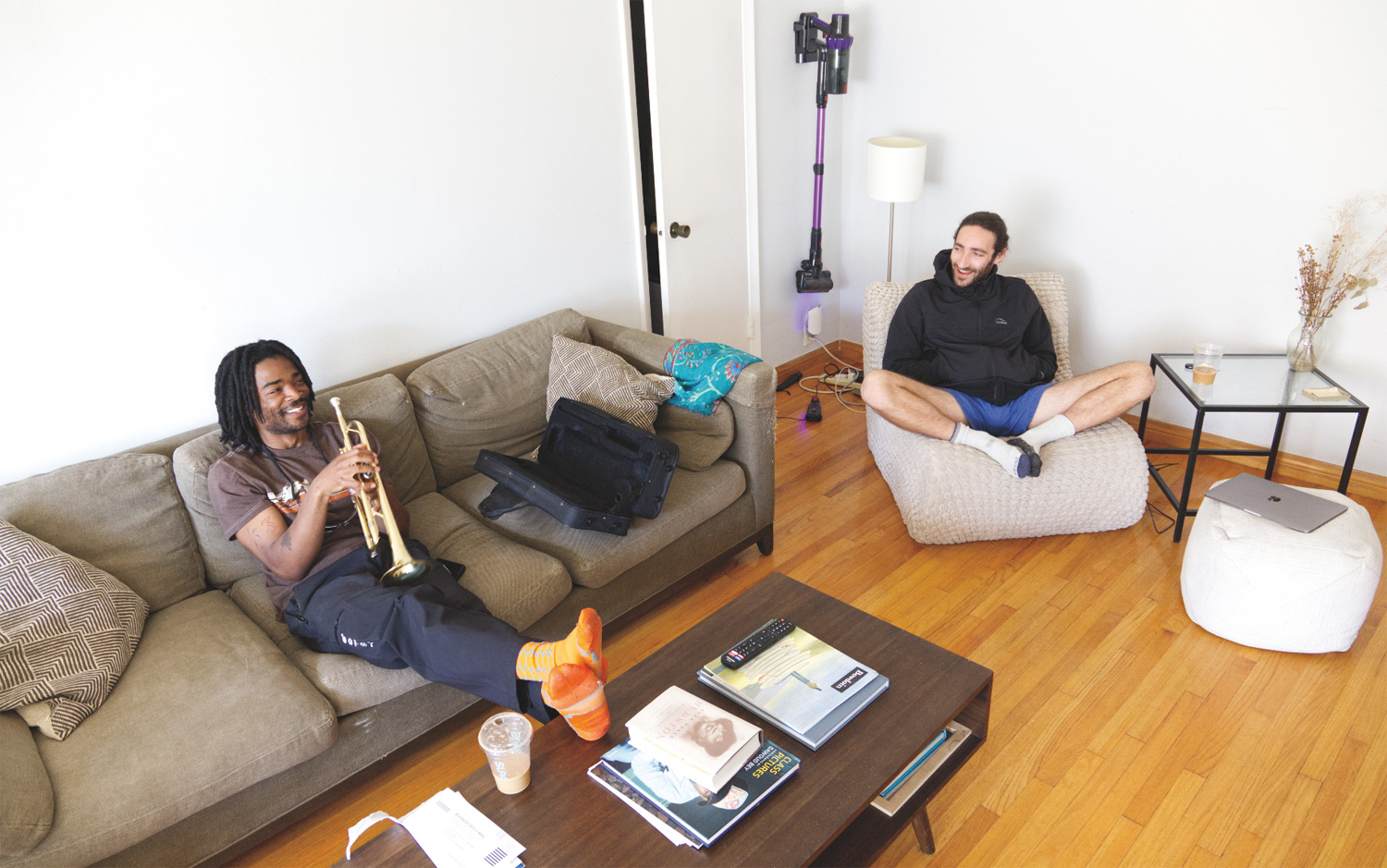
Omola AND Laifer have, in fact, built lives around music, but they look a little different from what they thought back at Bowdoin. In their apartment, Omola gathers his things to go to work for SomeSuch, a production studio he’s worked at since 2022. Paying the bills for Laifer is a mix of musical gigs—mostly remote music lessons, scoring music for films, and short video projects.
“I’m teaching guitar for someone online today,” Laifer says.
“Not for me!” Omola blurts.
Laifer has been teaching Omola guitar too, and despite living together, they’ve been struggling to find a lesson time that works. For a minute, they bicker in the way of people who share so much—an apartment, a band, most of their lives for six-plus years. Laifer turns to me: “This is the nitty-gritty.” The nitty-gritty doesn’t last.
Omola grabs a trumpet out of a case that sits on the couch. “I’ve been trying to bring this back this year.” He starts playing.
“That tone! You hear that?” Omola laughs. He makes it through the head of Duke Ellington’s “Satin Doll” and halfway through “Somewhere Over the Rainbow.” He holds back a smile while he plays.
“I’d have to get better at it before bringing it to Fortuno,” Omola says before leaving for work. “I would have to know what I want to bring to the song.”
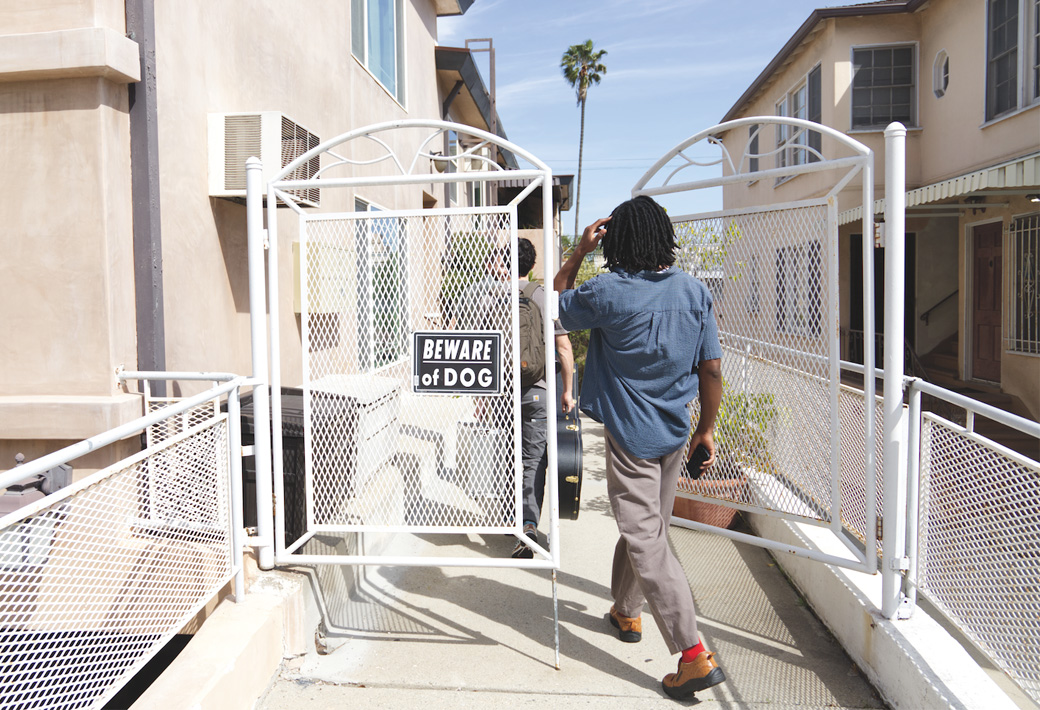
In fall of their senior year, Omola and Laifer released their first songs on major streaming platforms. When “Be” took off, it did so quickly. Within months they had an audience of tens of thousands of people, stretching far from Bowdoin’s campus.
No one on campus—at least no one making music—was surprised.
“I have never been surprised,” says Ariana Smith ’21, an a cappella acquaintance turned friend and collaborator. Smith has cowritten with Omola for years now, some of her contributions showing up in Fortuno tracks, and Laifer produced Smith’s 2020 single, “Nostalgia.”
“It’s because their music is good,” Smith says.
Smith is right. While the SoundCloud doo-wops and rough drafts showed promise, the first songs Fortuno released to major streaming platforms were a league above. “Be”—and its moody B-side, “Feel”—is a knockout, a slippery and genre-elusive track that has hints of Soulquarians-era R&B, the bedroom soul of early Omar Apollo, and the most hip-hop leaning Kaytranada beats. The songs impressed their professors, too.
“I could definitely see it,” said Professor of Music Vineet Shende of Fortuno’s potential. “Everything that they had—the harmonic sophistication and the thematic development—was married to these studio production techniques that really let them delve deep.” Shende and fellow music professor Frank Maucieri advised Omola and Laifer on their honors project, which included an album’s worth of new Fortuno songs and a year-end concert that packed Studzinski Recital Hall.
The signs that Fortuno would have a life beyond Bowdoin were plenty. “Be” was recorded in LA with Eli Koskoff, a jazz guitarist at USC’s Thornton School of Music and a longtime friend of Laifer’s. Omola and Laifer spent the previous summer in LA as interns, living in student housing with Koskoff and making music together. Koskoff eventually became the band’s third member, “Be” the first song they released together.
Omola and Laifer moved west that summer, permanently this time. In a very LA way, music was all around. At his job as a barista in Culver City, Laifer served coffee to singer Frank Ocean. They rarely performed live. They didn’t pitch “Be” to playlist curators. They barely posted on Instagram. It still blew up.
Not long after, Omola was playing Fortuno over the speakers at his café job when in walked Phoebe Bridgers, solo star and member of the Grammy-winning group boygenius.
“She was like, ‘You have a beautiful voice,’” Omola says, a flex worthy of sharing into one’s eighties at least.
The song playing on those speakers for Bridgers was “Home,” which they released that fall, just a few months after moving to LA. Cozier and more folk-inspired than anything they had released prior, “Home” earned Fortuno an audience even wider than “Be” had, becoming its first single to hit a million streams on Spotify.
Omola and Laifer speak of these first months in LA with wistful euphoria. Making it in the music industry in any way is difficult. But Laifer and Omola will tell you that, at that point, they had no doubts.
“Personally,” Laifer tells me, thinking back, “I was like, ‘I’m in a band with literally the most talented people I know. There’s no way this fails.’”
Laifer says that their confidence wasn’t due only to the quality of the songs, but the way they gained traction on streaming platforms. “Be” caught a foothold within Spotify’s Discover Weekly algorithm, showing up on more and more playlists as others saved it to their libraries, snowballing from there.
Omola and Laifer rarely performed live. They didn’t pitch “Be” to playlist curators. They barely posted on Instagram. It still blew up. In our current streaming age, it’s a scenario that only happens in the prayers of introverts. For Fortuno, it happened once, and then it happened twice more—in a smaller way for “Do Girl,” and in a much bigger way for “Home.”
“We always liked our own music,” Laifer says. “But it was the fact that all that growth wasn’t due to any marketing or advertising on our part; it was all kind of natural. It gave us confidence.”
Life happens, though, and dreams become moving targets. After 2019, the pandemic hit, forcing Omola, Laifer, and Koskoff back home and back east. They never stopped releasing music—the summer of 2020 brought “Wait,” the group’s third-most-streamed song to date, as well as Damn, We’re Getting Close, a mixtape of old Fortuno recordings released via Bandcamp to raise money for an LA arts school. When they later moved back to LA, they kept going, releasing an EP almost yearly until 2024. The music’s quality never dipped, but no Fortuno release after 2019 reached the quick streaming heights set by “Be” and “Home.”
“It didn’t turn out like we thought it would,” says Laifer.
After Omola goes to work, Laifer and I are in their living room, digging through his laptop. Laifer is a serial archivist—he doesn’t delete texts, so there are drafts of old Fortuno songs in iMessage that he and Omola sent back and forth years ago.
There’s one from 2017: the white box of an audio file from Ellis, a reply of a fire emoji and prayer hands from Omola. They were both studying abroad at the time—Laifer in New Zealand, Omola in Germany—still finding ways to make music. Nearly a decade of texts and .wav files add up, Laifer says. There’s barely any space left on his 2 TB Mac.
Today, other things fill up space there too. Since quitting his barista job, music has been Laifer’s main hustle, but that hustle takes many forms. There are Logic projects for short films he’s scored, commercials he’s composed for (in one, Will Arnett announces a new promotion for Reese’s Peanut Butter Cups over music that could be a rough Fortuno demo), and files for morningtime, Laifer’s lo-fi beats solo project. And, of course, there’s Fortuno.
“I think the goal would be to make music and have it support me,” says Laifer. “Originally, that goal was Fortuno and Fortuno only. Over the years, it’s evolved into living a life with music in it: doing different things, Fortuno being one of them, with the goal of supporting myself with music and figuring it out as I go. The path is sort of being forged along the way.”
Omola feels similarly. “In the past, I was like, I’m trying to be a superstar,” he says, the blunter of the two. Nowadays, he says that, while he still has those goals—“I want to play the shows; I want to have music in movies. I want to go on tour. I want to collab with cool artists. I want all of it”—the main goal is to be able to support himself through music alone.
But Omola also says that now his ambitions include directing. He’s been privy to film production through his work at SomeSuch, where he recently helped shoot a music video for Paris Texas, another genre-defying group making noise in the LA scene.
Spending time at their home in LA, you get the sense that, while Omola and Laifer aren’t where they envisioned they’d be with Fortuno, any frustration is fuel for a bigger fire. At twenty-eight, they haven’t left their younger selves’ aspirations unfulfilled; they’ve let those aspirations morph and grow, change, expand, gain attachments. The dreams are still there, just different.
“Our dreams are looking different now,” is what Omola sings on “Never Too Late,” Fortuno’s first single since Sky Is Everywhere, and the almost-title track of It Is Never Too Late to Love, the project they are previewing to a roomful of friends.
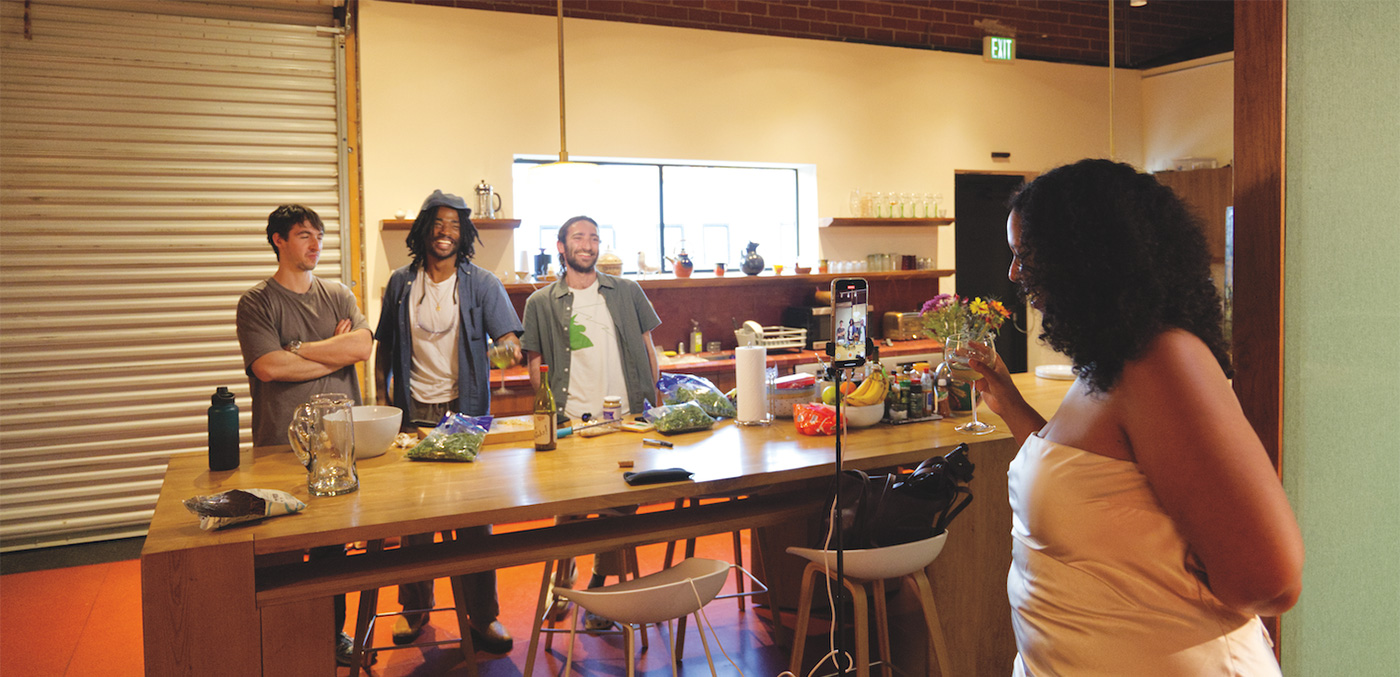
The pizza has arrived. The Modelos have been put on ice. The good wine has been brought over from the shop down the street. An iPhone tripod has been set up by a window for an interview bound for TikTok—something Laifer and Omola say they’re trying to get better at.
I shoot photos and look for the R&B star Omola said might make it, but I don’t find her. What I do find is a community eagerly anticipating what Omola, Laifer, and Koskoff will do next. Laifer and Omola might say they don’t feel quite part of a music scene as Fortuno in LA, but there certainly is a scene here in this room, built from the community they’ve built.
There are Bowdoin faces here, too—filmmaker Kayli Weiss ’18 lives nearby, and photographer Darius Riley ’18 happens to be in town, visiting from the Bay Area. Both swing through.
For many Bowdoin people, Fortuno has, in many ways, already made it. For Smith, it’s always been this way. “They made it the moment that they released their first songs, or even demos,” says Smith, who worked with Omola on the melodies on “Never Too Late.” “They have youth in Chicago listening to ‘getwiddit,’” Smith says.
“There are coffee shops in Brooklyn playing Fortuno. There’s a community surrounding Fortuno that cares about the people and appreciates the art—that’s making it. They are so deserving.”
I agree with her.
The music industry does not move on what artists deserve—if it did, more would get their “moment in the sun” and all of them would get health insurance. For music lovers on Bowdoin’s campus around 2018 and 2019, Fortuno showed the possibility of a future beyond. Beyond their laptops, beyond their dorm rooms, beyond Gibson and Studz. They were also simply a band who made very good music, populating our playlists and decorating the memories of our late teens and twenties just as any other band’s music might; it soundtracked friendships, love, loss, nostalgia, homesickness, uncertainty. They were and continue to be all of it. Any artist who is all of those things deserves it all back.
At the end of the set, the sounds of Fortuno’s DIY setup give way to applause, and then, streaming dance music. Omola dances in a space between cubicles, and Laifer catches up with friends by the kitchen table. The song playing over the monitors is the TikTok hit of the singer who was maybe going to come. She didn’t. But that’s okay. I stand and wonder how many times a crowd of people I don’t know have danced to a song by people I do know, by these people I do know.
Life is still and always happening. Omola and Koskoff are pulled by the East Coast—Omola by his family in Brooklyn, Koskoff by the idea of settling down with his fiancée—while a relationship anchors Laifer to LA.
But, in this moment, in this office, the only feeling worth feeling is the one Laifer described the day before: these are some of the most talented people you know, and there’s no way they fail. Whatever that means for Fortuno in the years ahead—whatever “making it” looks like—I’m inclined to believe.

Chris Ritter ’21 is a writer, photographer, and musician from Lexington, Virginia. His work has been featured on NPR and in Condé Nast Traveler and more. He records music under the name Nodding Terms.
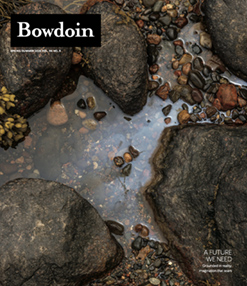
This story first appeared in the Spring 2025 issue of Bowdoin Magazine. Manage your subscription and see other stories from the magazine on the Bowdoin Magazine website.